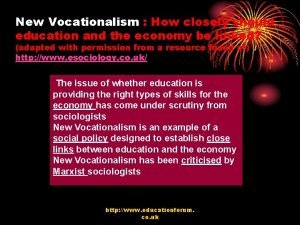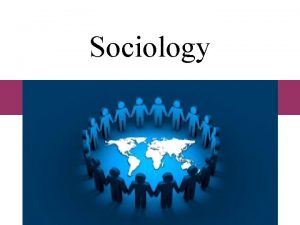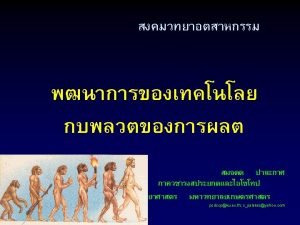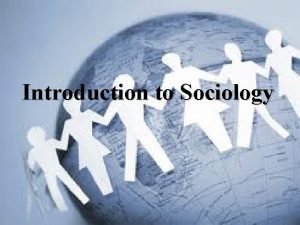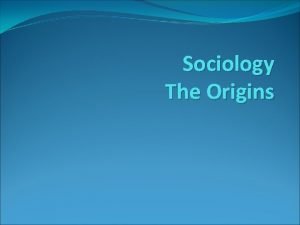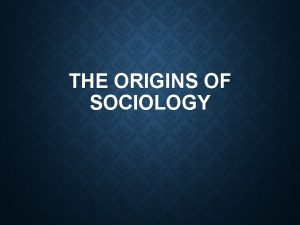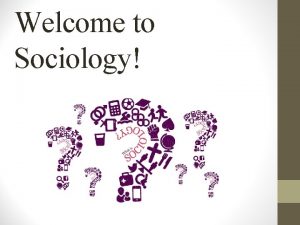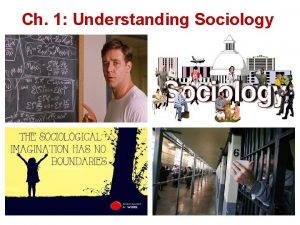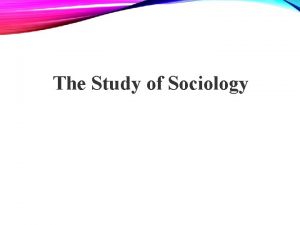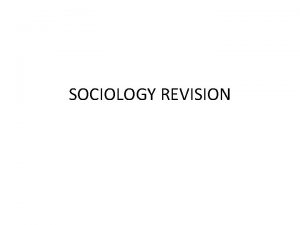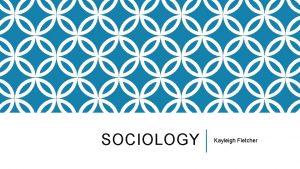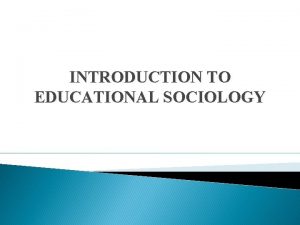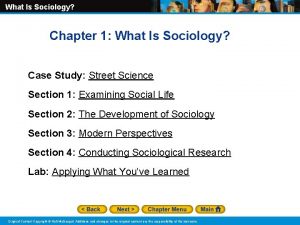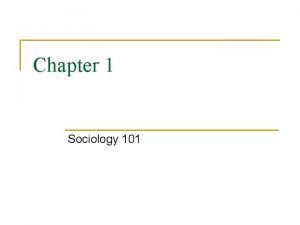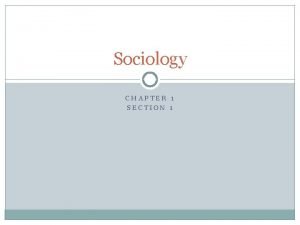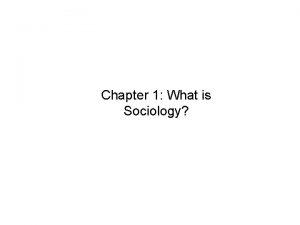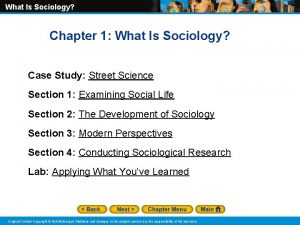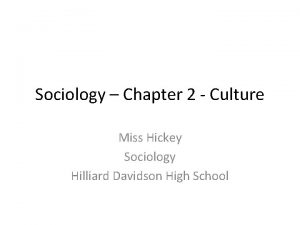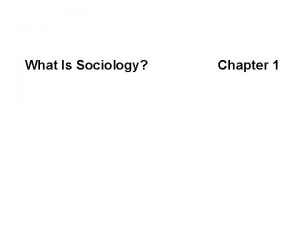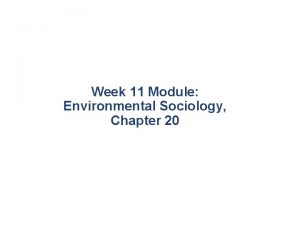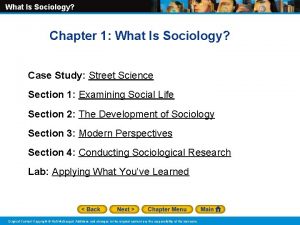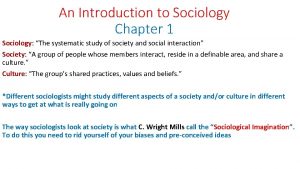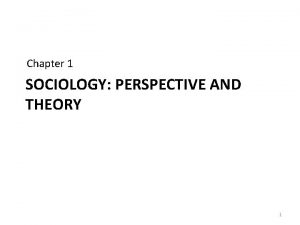The Sociology of Education Chapter 4 Sociology n







































- Slides: 39

The Sociology of Education Chapter 4

Sociology n n n A method for bringing social aspirations and fears into focus Forcing sharp and analytic questions about the societies and cultures in which people live Trying to uncover underlying patterns that give facts their larger meaning is the purpose of making social theories

Reflective Practitioners n n n Must know how major elements of society fit together Understand the relation between school and society Understand why students behave the way they do in and out of school

Main Elements of the Sociology of Education n n Theories about the relation between school and society Whether schooling makes a major difference in individuals’ lives How schools influence social inequalities How school processes affect the lives of children, teachers, and other adults

Four Interrelated Levels of Sociological Analysis n n The Societal level and its system of social stratification The Institutional level, including families, schools, churches etc. The Interpersonal level, including processes, symbols and interactions The Intrapsychic level, including individual’s thoughts, beliefs, values

Individual Actions n n n Determined by external forces (determinism) Freely shaped by individuals (voluntarism) Sociological perspective recognizes free will within the context of the power of external circumstances, often related to group differences within social stratification system

Theoretical Perspectives n n Functional Theories…stresses the interdependence of the social system, how well the parts are integrated with each other Emile Durkheim…education in all societies of critical importance in creating moral unity, social cohesion, and harmony…moral values are the foundation of society

Functionalists n n Assume that consensus is the normal state in society and conflict represents a breakdown of shared values Educational reform is to create structures, programs and curricula that are technically advanced, rational, and encourage social unity

Conflict Theories n n n Social order is based on the ability of dominant groups imposing their will on subordinate groups through force, cooptation, and manipulation The glue of society is economic, political, cultural, and military power Ideologies legitimate inequality and unequal distribution of goods as inevitable outcome of biology or history

Conflict Theories n n n Whereas functionalists emphasize cohesion, conflict theorists emphasize struggle in explaining social order The “achievement ideology” of schools disguise the real power struggles which correspond to the power struggles of the larger society Karl Marx the intellectual founder of conflict theories

Max Weber n n n Weber examined status cultures as well as class position…people identify their group by what they consume and with whom they socialize Bureaucracy the dominant authority in the modern state Made distinction between the “specialist” and the “cultivated” person…what should be the goal of education?

Weberian Conflict Theorists n n n Analyze schools from the points of view of status competition and organizational constraints Schools as autocracies in “perilous equilibrium” near anarchy because students are forced to go to them Schools seen as oppressive and demeaning, student noncompliance becomes a form of resistance

Conflict Theorists n n Educational expansion best explained by status group struggle…educational credentials such as college diplomas primarily status symbols rather than indicators of actual achievement to secure more advantageous places in employment and social structure “Cultural capital” passed on by families and schools…schools pass on social identities that either help or hinder life chances

Interactional Theories n n n Primarily critiques and extensions of functional and conflict perspectives It is exactly what one does not question that is most problematic at a deep level e. g. how students are labeled “gifted” or “learning disabled” Speech patterns reflect social class backgrounds and schools are middle-class organizations, disadvantaging working-class children

Effects of Schooling on Individuals n n n Knowledge and Attitudes Employment Education and mobility, the “civil religion”… education amount vs. route…for the middle class, education may be linked to mobility but for the rich and the poor, it may have very little to do with it

Inside the Schools n n n Schools from an organization point of view…effects of school size Curriculum expresses culture…whose culture? Tracking in public schools, rarely in private schools

Teacher Behavior n n n 1000 interpersonal contacts each day Instructor, disciplinarian, bureaucrat, employer, friend, confidant, educator…can lead to “role strain” Difference of teacher expectations for different students…based on what?

Student Peer Groups and Alienation n n Students in vocational programs and headed toward low-status jobs most likely to join a rebellious subculture Average 12 year old has seen 18, 000 television murders Four major types of college students: careerists, intellectuals, strivers, unconnected Schools are far more than collections of individuals; they develop cultures, traditions, and restraints that profoundly influence those in them

Education and Inequality n n n By 1998 income differences became wider, the U. S. turning into a “bipolar” society of great wealth and great poverty and an ever shrinking middle class Inadequate schools Tracking De facto segregation Gender

Basil Bernstein’s Theory of Pedagogic Practice n n n Provides for the possibility of a synthesis of theoretical orientations, Marx, Weber, and Durkheim The theoretical always precedes the empirical and then research modifies theory Develop code theory that examined interrelationships between social class, family, and school

Basil Bernstein’s Theory n n Social class differences in the communication codes of working class and middle class children…differences that reflect class and power relations in the social divisions of labor, family, and school Restricted codes are context dependent and particularistic, elaborated codes are context independent and universalistic

Bernstein’s Theory n n Code refers to a “regulative principle which underlies various message systems, especially curriculum and pedagogy Curriculum defines what counts as valid knowledge…pedagogy defines what counts as valid transmission of knowledge and evaluation defines what counts as valid realization of knowledge on the part of the taught

Bernstein’s Theory n n Bernstein’s work on pedagogic discourse is concerned with the production, distribution, and reproduction of official knowledge and how this knowledge is related to structurally determined power relations. The schools reproduce what they are ideologically committed to eradicating

Bernstein’s Theory n n Changes in the division of labor create different meaning systems and codes…incorporates a conflict model of unequal power relations Such functioning doesn’t lead to consensus but forms the basis of privilege and domination

On Understanding the Processes of Schooling n n Origins of teacher expectations have been attributed to such diverse variables as social class, physical appearance, contrived test scores, sex, race language patterns, and school records Labeling theory as an explanatory framework for the study of social deviance appears to be applicable to the study of education as well

Labeling Theory n n The labeling approach allows for an explanation of what, in fact, is happening within schools Over time, the consequences of having a certain evaluative tag influence the options available to a student within a school Labeling theory is interested in why people are labeled and who it is that does the labeling Deviance is a social judgment imposed by a social audience

Labeling Theory n n n How does a community decide what forms of conduct should be singled out for this kind of attention? Deviance is functional to clarifying group boundaries, providing scapegoats, creating outgroups who can be the source of furthering ingroup solidarity Social control can have the paradoxical effect of generating more of the very behavior it is designed to eradicate

Labeling Theory n “The first dramatization of the ‘evil’ which separates the child out of his group…plays a greater role in making the criminal than perhaps any other experience…. He now lives in a different world. He has been tagged. The person becomes the thing he is described as being. ”

Labeling Theory n n n “The secondary deviant…is a person whose life and identity are organized around the facts of deviance. ” It is teachers who use labels such as “bright” or “slow” School achievement is not simply a matter of a child’s native ability, but involves directly and inextricably the teacher as well.

Labeling Theory n n Race and ethnicity are powerful factors in generating teacher expectations High expectations in elementary grades are stronger for girls than boys Expectations teachers hold for students can be generated as early as the first few days of school and then remain stable from then on “If men define situations as real, they are real in their consequences. ” Self-fulfilling Prophecy

Labeling Theory n n The higher one’s social status, the less the willingness to diagnose the same behavioral traits as indicative of serious illness in comparison to the diagnosis given to low status persons. Teacher expectations are not automatically self-fulfilling

The Politics of Culture n n n Tracking students leads to “fast” and “slow” learners and racial and socioeconomic segregation within schools Examine the ideology of entitlement and how some see it as the way things ought to be Whose life style is valued and whose ways of knowing is equated with “intelligence”

The Politics of Culture n n In virtually all racially mixed secondary schools, tracking resegregates students with mostly White and Asian students in the high academic tracks and mostly African American and Latino students in the low tracks Elite parents argue that their children will not be well served in detracked classes

The Politics of Culture n n n The real stakes of detracking are generally not academics at all, but status and power Economic capital is not the only form of capital necessary for social reproduction, also political, social, and cultural Cultural capital consists of culturally valued tastes and consumption patterns

The Politics of Culture n n n Emphasis must be placed on subtleties of taste— for example, form over function, manner over matter Students are frequently rewarded for their taste, and for the cultural knowledge that informs it. “Objective” criteria of intelligence and achievement is actually extremely biased toward the subjective experience and ways of knowing of elite students.

The Politics of Culture n n n Through the educational system, elites use their economic, political, and cultural capital to acquire symbolic capital—the most highly valued capital in a given society or local community. The socially constructed status of institutions such as schools is dependent upon the status of the individuals attending them. Elites “record” privilege through formal educational qualifications, which then serve to “conceal” their inherited capital

The Politics of Culture n n n Broadly speaking, ideology is meaning in the service of power. Their children would only encounter Black students in the hallways and not in their classrooms…diversity at a distance “…the White community should make the decisions about the schools…because they are paying the bill. ”

The Politics of Culture n n The arbitrary placement system is more sensitive to cultural capital than academic “ability. ” Standardized tests are problematic on two levels. First, the tests themselves are culturally biased. Second, scores on these tests tend to count more for some students than for others.

The Politics of Culture n n n Local elites used four practices to undermine detracking efforts Threatening flight, co-opting the institutional elites, soliciting buy-in from the “not-quite elite, ” and accepting detracking bribes Parents are victims of a social system in which scarcity of symbolic capital creates an intense demand for it among those in their social strata
 Vocationalism definition sociology
Vocationalism definition sociology Hát kết hợp bộ gõ cơ thể
Hát kết hợp bộ gõ cơ thể Ng-html
Ng-html Bổ thể
Bổ thể Tỉ lệ cơ thể trẻ em
Tỉ lệ cơ thể trẻ em Voi kéo gỗ như thế nào
Voi kéo gỗ như thế nào Chụp tư thế worms-breton
Chụp tư thế worms-breton Chúa yêu trần thế
Chúa yêu trần thế Các môn thể thao bắt đầu bằng tiếng chạy
Các môn thể thao bắt đầu bằng tiếng chạy Thế nào là hệ số cao nhất
Thế nào là hệ số cao nhất Các châu lục và đại dương trên thế giới
Các châu lục và đại dương trên thế giới Công thức tính độ biến thiên đông lượng
Công thức tính độ biến thiên đông lượng Trời xanh đây là của chúng ta thể thơ
Trời xanh đây là của chúng ta thể thơ Mật thư tọa độ 5x5
Mật thư tọa độ 5x5 Phép trừ bù
Phép trừ bù độ dài liên kết
độ dài liên kết Các châu lục và đại dương trên thế giới
Các châu lục và đại dương trên thế giới Thơ thất ngôn tứ tuyệt đường luật
Thơ thất ngôn tứ tuyệt đường luật Quá trình desamine hóa có thể tạo ra
Quá trình desamine hóa có thể tạo ra Một số thể thơ truyền thống
Một số thể thơ truyền thống Cái miệng bé xinh thế chỉ nói điều hay thôi
Cái miệng bé xinh thế chỉ nói điều hay thôi Vẽ hình chiếu vuông góc của vật thể sau
Vẽ hình chiếu vuông góc của vật thể sau Biện pháp chống mỏi cơ
Biện pháp chống mỏi cơ đặc điểm cơ thể của người tối cổ
đặc điểm cơ thể của người tối cổ V. c c
V. c c Vẽ hình chiếu đứng bằng cạnh của vật thể
Vẽ hình chiếu đứng bằng cạnh của vật thể Tia chieu sa te
Tia chieu sa te Thẻ vin
Thẻ vin đại từ thay thế
đại từ thay thế điện thế nghỉ
điện thế nghỉ Tư thế ngồi viết
Tư thế ngồi viết Diễn thế sinh thái là
Diễn thế sinh thái là Dạng đột biến một nhiễm là
Dạng đột biến một nhiễm là Bảng số nguyên tố
Bảng số nguyên tố Tư thế ngồi viết
Tư thế ngồi viết Lời thề hippocrates
Lời thề hippocrates Thiếu nhi thế giới liên hoan
Thiếu nhi thế giới liên hoan ưu thế lai là gì
ưu thế lai là gì Sự nuôi và dạy con của hươu
Sự nuôi và dạy con của hươu Sự nuôi và dạy con của hươu
Sự nuôi và dạy con của hươu
